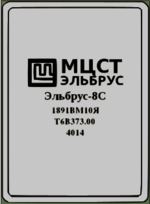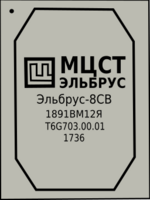Engineering:Elbrus-8S
 | |
| Performance | |
|---|---|
| Max. CPU clock rate | 1.3 GHz |
| Architecture and classification | |
| Instruction set | Elbrus 2000 |
| Physical specifications | |
| Cores |
|
| History | |
| Predecessor | Elbrus-4S |
| Successor | Elbrus-16S |
 | |
| Performance | |
|---|---|
| Max. CPU clock rate | 1.5 GHz |
| Architecture and classification | |
| Instruction set | Elbrus 2000 |
| Physical specifications | |
| Cores |
|
| History | |
| Predecessor | Elbrus-4S |
| Successor | Elbrus-16S |
The Elbrus-8S (Russian: Эльбрус-8С) is a Russian 28 nanometer 8-core microprocessor developed by Moscow Center of SPARC Technologies (MCST). The first prototypes were produced by the end of 2014 and serial production started in 2016.[3] The Elbrus-8S is to be used in servers and workstations.[4] The processor's architecture allows support of up to 32 processors on a single server motherboard.[5][6]
In 2018 MCST announced plans to produce Elbrus-8SV an upgraded version of the 8C but with doubled performance. The CPU features 576 Gflops and 1.5 GHz, as well as DDR4 support instead of DDR3.[1][2] Engineering samples were already completed in Q3 2017.[7] Development was completed in 2019[8] and its fabrication started in 2020.
Supported operating systems
The Elbrus-8S and -SV processors support binary compatibility with Intel x86 and x86-64 processors via runtime binary translation.[2] The documentation suggests that the processors can run Windows XP and Windows 7.[2] The processors can also run a Linux kernel based OS compiled for Elbrus.
Elbrus Elbrus-8S information
| Production start | 2014 (samples), 2015 (for data-servers) |
|---|---|
| Cores | 8 |
| Computer architecture | VLIW, Elbrus (proprietary, closed) version 4, 64-bit |
| Tech. node | 28 nm, TSMC process |
| Clock rate | 1.3 GHz |
| Cache |
|
| Integrated memory controller | DDR3-1600, 4 72-bit channels (with ECC) |
| Peak performance per CPU, Gflops | 125 for DP or 250 for SP |
| Supported programming platforms | C, C++, Java, Fortran-77, Fortran 90 |
| Performance | 250 Gflops |
Elbrus Elbrus-8SV information
| Production start | 2018 Q4[9] |
|---|---|
| Cores | 8 |
| Computer architecture | VLIW, Elbrus (proprietary, closed) version 5, 64-bit |
| Tech. node | 28 nm, TSMC process |
| Clock rate | 1.5 GHz |
| Cache |
|
| Integrated memory controller | 4 channel DDR4-2400 registered as ECC, to 68.3 GB/s
64 GB per processor, 1 TB address space |
| Peak performance per CPU, Gflops | 288 for DP or 576 for SP |
| Operating conditions | −60...+85 °C, −40...+90 °C |
| Performance | 576 Gflops |
References
- ↑ 1.0 1.1 "Руководство по эффективному программированию на платформе «Эльбрус» — Документация Руководство по эффективному программированию на платформе «Эльбрус» 1.0". http://ftp.altlinux.org/pub/people/mike/elbrus/docs/elbrus_prog/html/index.html. Retrieved 1 June 2020.
- ↑ 2.0 2.1 2.2 2.3 Cutress, Ian (1 June 2020). "Russia’s Elbrus 8CB Microarchitecture: 8-core VLIW on TSMC 28nm". www.anandtech.com. https://www.anandtech.com/show/15823/russias-elbrus-8cb-microarchitecture-8core-vliw-on-tsmc-28nm. Retrieved 1 June 2020.
- ↑ "The Central processor "Elbrus-8S" (TUGI.431281.016)". http://www.mcst.ru/elbrus-8c. Retrieved 16 May 2018.
- ↑ "Elbrus 8C mit acht Kernen soll 250 GFlops erreichen" (in de). Golem.de. 14 July 2014. https://www.golem.de/news/russischer-prozessor-elbrus-8c-mit-acht-kernen-soll-250-gflops-erreichen-1407-107869.html. Retrieved 16 May 2018.
- ↑ A pilot batch of 8-core processors Elbrus-8S started in manufacture
- ↑ New Elbrus-8C processor could usher in a new level of computing speed
- ↑ "Elbrus 8SV data". http://www.mcst.ru/elbrus-8cb. Retrieved 16 May 2018.
- ↑ В Минпроторге заявили о создании российского процессора "Эльбрус-8СВ"
- ↑ "Russian Microprocessors of the Elbrus Architecture Series for Servers and Supercomputers". http://russianscdays.org/files/talks/VVolkonsky-RSCDays-2015.pdf. Retrieved 16 May 2018.
External links
- Official MCST announcements
- Data provided by MCST

